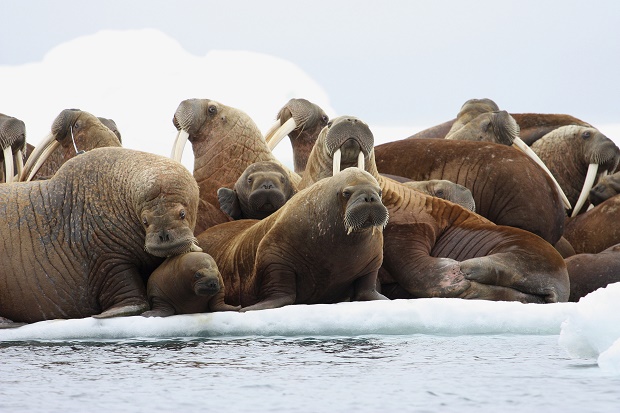US investigates deaths of 25 walrus on Alaska coast

In this July 17, 2012, file photo, adult female walruses rest on an ice flow with young walruses in the Eastern Chukchi Sea, Alaska. Federal wildlife officials have declined the suggestion of a wildlife advocacy group to place experimental rafts off Alaska’s northwest coast as a resting place for walrus. A US Fish and Wildlife Service regional director says the agency is studying Pacific walrus coming to shore in huge numbers along the Chukchi Sea because of shrinking sea ice. AP FILE PHOTO
ANCHORAGE, Alaska — The US Fish and Wildlife Service said Friday it is investigating the deaths of 25 Pacific walrus found on an isolated northwest Alaska beach.
A person connected to a US Air Force radar station in the remote area spotted the animals and notified the agency this week. The walrus included 12 pups, and some were missing their heads and tusks.
Walrus have become a cause for concern as climate warming diminishes summer sea ice. Arctic sea ice hit its summer minimum last week at 1.7 million square miles (4.4 million sq. kilometers), down 240,000 square miles (621,600 million sq. kilometers) from 2014, according to the National Snow and Ice Data Center. It’s the fourth-lowest level on record for minimum summer sea ice.
The cause of death has not been determined, said Fish and Wildlife Service spokeswoman Andrea Medeiros, and investigators do not want to speculate.
“We can’t come to any conclusions based on a report,” she said Friday. “You have to go out and investigate.”
Only Alaska Natives who live in the state may hunt walrus for subsistence or for the creation of handicrafts or clothing.
The missing heads and tusks don’t necessarily indicate illegal activity, Medeiros noted. The animals could have died in the ocean and washed ashore, she said.
US regulations allow anyone to collect bones, teeth and ivory of dead marine mammals found on beaches or land within a quarter-mile of the ocean, though they must follow certain rules. Walrus skulls with tusk attached are collectors’ items. The ivory often is carved and made into jewelry.
However, walrus killed only for the collection of ivory is considered wasteful, and “head-hunting” is illegal.
The carcasses were photographed by a person at the radar station at Cape Lisburne, northeast of the Bering Strait.
Investigators reached the Chukchi Sea beach Thursday. Officers wanted to investigate the carcasses before they were picked apart by polar bears, gulls or other scavengers.
Walrus breed in the Bering Sea. Many walrus found in the Chukchi Sea north of the Bering Strait are females with pups that ride the edge of the sea ice north, using the ice as a moving platform to dive and rest.
The animals feed on clams, sea snails and other food on the ocean bottom but cannot swim indefinitely. In recent years, sea ice has receded north beyond the shallow continental shelf to water that exceeds 2 miles (3.2 million kilometers) deep, beyond the diving range of an adult walrus.
Walrus in large numbers on shore were first spotted on the U.S. side of the Chukchi Sea in 2007. An estimated 35,000 Pacific walrus were photographed Sept. 2 near Point Lay northeast of Cape Lisburne.
When the animals are grouped shoulder-to-shoulder in massive herds, they are subject to stampedes if startled by an airplane, hunter or polar bear.
RELATED STORY